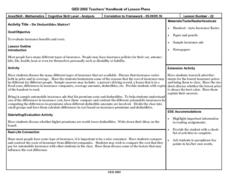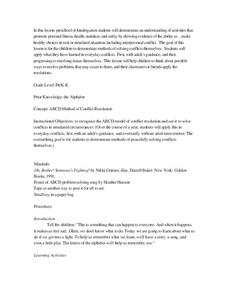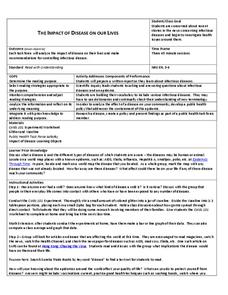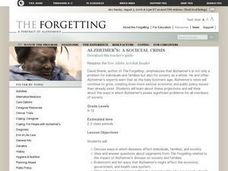Curated OER
Food Insecurity
Explore food insecurity and resource scarcity with your class. They discuss the sharing of scarce resources, how to be good caretakers of these resources, and how choices impact the entire world.
Curated OER
Modals: Can, May and Will Verbs: Present Tense
Cover can, may, will, and shall with this lesson plan on using modals in the present tense. Starting off with a warm-up activity, the resource includes a text to analyze, examples of modals, and exercises with answers. The language in...
Curated OER
Globalization
Students explore the impact of technology around the world. In this globalization activity, students read the noted articles about the effects of technology on day-to-day activities. Students then participate in a classroom discussion of...
Curated OER
Do Deductibles Matter?
Fifth graders discuss insurance and the cost of automobile insurance. They compare and contrast the costs of insurance from different companies. They figure the savings from the lowest deductible to the highest deductible.
Curated OER
Taming Wild Land
Third graders consider the habitat needs of living things and how extensive farming in an area can affect the plants and animals of a region. They participate in a simulation to show how changing the habitat in one area can greatly...
Curated OER
Prairie People
Eighth graders interview a person who explains the lifestyles of people who lived on the prairies in the eighteenth and nineteenth centuries. They examine how today's lifestyles impact the environment and write up what they learned.
Curated OER
Fun with the Food Pyramid
Students explore the five food groups and design a graphic organizer to organize the data researched. A one day food diary kept by students assists them in self-monitoring and self-evaluation of their eating habits.
Curated OER
Earth Day
Students explain that there are pollutants in the Anacostia River, what those pollutants can cause, and how to prevent further pollution. They read about pollution and graph levels of fecal coliform in the water.
Curated OER
DNA Fingerprinting
Pupils discuss methods used by forensic scientists and the basics of DNA and how it can be used to identify an individual after reading an article from The New York Times.
Curated OER
Small Pox Scare Wks 1-2
Learners identify basic similarities and differences between B- and T-lymphocytes, stressing function, location, and role. They complete a worksheet that requires them to apply knowledge about ELISA and antibodies.
Hot Docs
Docs for School: Viewing and Teaching Guide
Teaching documentary in your class? Inform your instruction with a guide meant to support teachers as they begin with documentary. The resource includes information on what a documentary is as well as documentary modes, elements, and...
Environmental Protection Agency (EPA)
Teachers' Guide to Using A Day In the Life of a Drop
Hydrology hopefuls learn about their local watershed. Through discussion and online interactives, they see that their habits affect the water supply. The lesson concludes with a pledge to filter out bad water usage habits. It makes a...
Curated OER
Conflict Resolution
Young scholars demonstrate conflict resolution skills. For this character education lesson, students read the book Oh, Bother! Someone's Fighting! and sing a song which models a conflict resolution strategy.
Curated OER
Are We Couch Potatoes or Busy Bees? Data Analysis of Physical Activity in School
Young scholars study practical data analysis within the constraints of the scientific method. For this data lesson students collect and enter data into a computer spreadsheet then create graphs.
Nemours KidsHealth
Breakfast: Grades K-2
Students investigate nutrition and the role breakfast plays in everyday life. In this healthy eating activity, students discuss their own breakfast habits and the meal they would prefer to have every morning. Students...
Curated OER
Project Helping Hands
Students work as a team to help improve the quality of life in rural Africa and develop a plan how to spend grant money the United Nations has provided them with.
Curated OER
Feelings, Nothing More Than Feelings (Elementary, other)
Third graders describe emotions/ feelings which may lead to loss of self-control, introduce the concept of consequences and alternative choices.
Curated OER
Traffic signs and signals
Students understand and follow directions based on traffic signs. In this traffic signs lesson plan, students play the game red light green light and are asked why they stop and go according to the colors. They then are introduced to the...
Curated OER
Save the Earth: It's Everyone's Home!
Students demonstrate how to make earth-smart choices. In this environmental awareness lesson, students listen to a short lecture on environmentally friendly products. Students invent an environmentally friendly product and complete an...
Curated OER
Aqueduct Architecture: Moving Water to the Masses in Ancient Rome
Ninth graders compare ancient and modern technology in water transporting. In this lesson on the evolution of the aqueduct, 9th graders build a working aqueduct model and examine its components. They explain the importance and use of the...
Curated OER
The Impact of Disease on Our Lives
Students write a report about infectious diseases where they demonstrate their understanding of new terminology. In this writing lesson, students analyze the effect of disease in their lives and and make scientific inquiry about the...
Curated OER
Edgar Allan Poe: an Author Unit
Eighth graders study the life and writing of Edgar Allan Poe in this unit of work.
Curated OER
Germs: Learning Not to Share
Students have cinnamon sprinkled onto their hands and walk around the room touching objects within their reach. Students observe all of the objects containing cinnamon fingerprints to visualize where and how germs are spread.
Curated OER
Alzheimer's: A Societal Crisis
Students discuss ways in which diseases affect individuals, families, and society, and view and answer questions about segments from The Forgetting related to the impact of Alzheimer's disease on society and families. They brainstorm...























